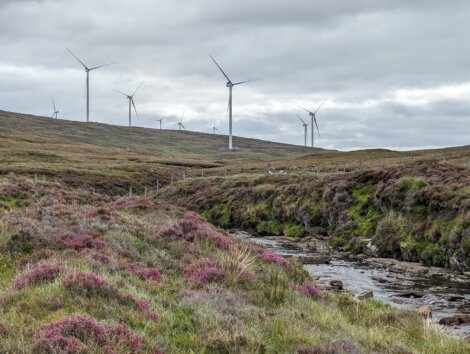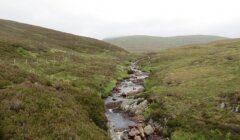Environment / Burn of Lunklet conditions remain ‘very poor’, report says
A NEW environmental report produced for the Viking Energy wind farm development highlights that conditions in the Burn of Lunklet remain “very poor”, according to data.
It adds that invertebrate fauna there have been “seriously impacted by changes in water and substrate quality”.
However, the report from Aquaterra Ecology says there have been potential signs of slight improvement since autumn 2022, with more invertebrates present in samples.
The Burn of Lunklet, which includes a Site of Special Scientific Interest (SSSI), has been a particular cause for concern during the construction of the Viking Energy wind farm in Shetland’s Central Mainland.
An increase in metals/minerals had been recorded there during the construction, with nearby a borrow pit – where material is excavated – thought to be a cause. Mitigation measures were introduced by the wind farm developer SSE Renewables last year.
Earlier this year there was also concern raised over the number of trout recorded in the burn.
The latest report focuses on invertebrate monitoring in relation to runoff from Scallafield Scord in autumn 2023.
It said that data demonstrates that the invertebrate fauna of Burn of Lunklet “continues to show signs of major impact from changes in water and habitat quality”.
It also said it is too soon to tell whether the signs of potential improvement can be sustained.
Some changes on a “much smaller magnitude” compared to the Burn of Lunklet were also noted in the Burn of Weisdale.
The report said: “Changes to the hydrochemistry of Burn of Lunklet and Burn of Weisdale have occurred during the construction of the Viking Energy Wind Farm.
In Burn of Lunklet, these have included periods of low pH (acidity), reduced concentration of dissolved organic carbon (DOC), increased concentrations of metals including aluminium, zinc, nickel and manganese, and elevated nitrate (TON).
Become a member of Shetland News
“In Burn of Weisdale, the main changes recorded have been increased concentration of zinc and aluminium. A number of investigations have identified runoff from Scallafield Scord as the primary source of contamination.”
Recommendations in the report are that efforts continue to improve the quality of run-off from Scallafield Scord.
“The efficacy of the mitigation measures should be monitored and periodically reviewed, and changes made where necessary,” it continued.
“It should be noted that mitigation should focus not only on increasing the pH of runoff, but ensuring that metal-rich complexes are deposited and removed before they reach sensitive stream habitats should continue.”
There is also a recommendation for two-season sampling of freshwater invertebrates continuing at the current suite of sites in 2024.
A spokesperson for Viking Energy Wind Farm said SEPA and the SIC were informed of the changes to the Burn of Lunklet and the Burn of Weisdale as per routine notifications of water quality reports.
“Treatment of the waters affecting both burns is progressing, and we will continue to work with our contractor and SEPA to resolve the issue and look at ways to improve the treatment system,” they said.
“In the meantime, we will continue to monitor both burns regularly as we remain committed to taking environmental responsibilities seriously by following the best practice in relation to environmental management.”
Frank Hay, the chairman of campaign group Sustainable Shetland, said the latest report is “disappointing but not surprising”.
“It is concerning that, in spite of mitigations, there is little or no improvement in the situation,” he added.
“As we have said all along, it is clear that for a development on the scale of Viking there are likely to be long term impacts on the surrounding land and water courses.
“Clearly, it has yet to be established if the so called ‘mitigations’ will do any good. There are lessons to be learned from this for other wind farm developments in the pipeline here.”
Become a member of Shetland News
Shetland News is asking its many readers to consider paying for membership to get additional features and services: -
- Remove non-local ads;
- Bookmark posts to read later;
- Exclusive curated weekly newsletter;
- Hide membership messages;
- Comments open for discussion.
If you appreciate what we do and feel strongly about impartial local journalism, then please become a member of Shetland News by either making a single payment, or setting up a monthly, quarterly or yearly subscription.



































































